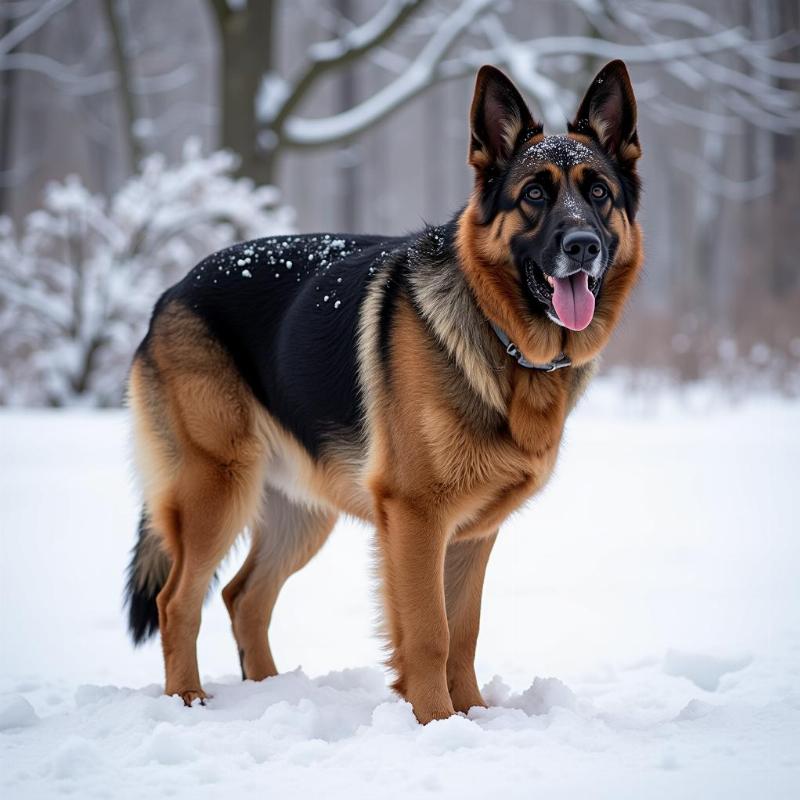German Shepherds, with their thick double coats, seem built for colder climates. But are German Shepherds really winter dogs? The answer isn’t a simple yes or no. While their heritage and physical characteristics suggest a tolerance for cold weather, several factors determine how well a German Shepherd handles winter’s chill. Let’s explore what makes these magnificent dogs suited for colder temperatures and what precautions you should take to ensure their comfort and safety during the winter months.
Understanding the German Shepherd’s Cold Weather Tolerance
German Shepherds originated in Germany, a country known for its varied climate, including cold winters. Their dense double coat, comprised of a thick outer coat and a soft, insulating undercoat, provides excellent protection against cold, wind, and even some precipitation. This natural insulation helps them retain body heat and stay warm in freezing temperatures. However, this doesn’t make them immune to extreme cold.
 German Shepherd Dog in the Snow
German Shepherd Dog in the Snow
Factors Affecting a German Shepherd’s Winter Comfort
While a German Shepherd’s double coat offers significant protection, several factors influence their cold tolerance. Age, health, and acclimation play crucial roles. Puppies and senior dogs are more vulnerable to cold than adult dogs. Underlying health conditions can also compromise their ability to regulate body temperature. A dog accustomed to milder climates will need time to adjust to colder temperatures.
Acclimating Your German Shepherd to Winter
Gradual exposure to cold weather is essential. Start with short walks and gradually increase the duration as your dog acclimates. Monitor your dog closely for signs of discomfort, such as shivering, whining, or lifting their paws.
Protecting Your German Shepherd in Winter
Even with their natural cold tolerance, German Shepherds can benefit from extra protection in extreme weather conditions. Consider investing in a xl dog jackets for winter for added warmth during walks. Fleece lined muttluks dog boots can protect their paws from ice, snow, and de-icing chemicals. Provide a warm, dry shelter, like a properly sized dog house german shepherd size, if your dog spends time outdoors.
Grooming for Winter
Regular grooming is crucial during winter. The double coat can become matted, reducing its insulating effectiveness. Using the best deshedding shampoo for dogs can help maintain a healthy, insulating coat.
Are German Shepherds Indoor or Outdoor Dogs in Winter?
Ideally, German Shepherds should be primarily indoor dogs, especially during winter. While they can tolerate cold temperatures for periods, extended exposure can be detrimental. Bring your German Shepherd indoors during extremely cold weather, snowstorms, or icy conditions.
Conclusion
So, are German Shepherds winter dogs? They are certainly better equipped for cold weather than many breeds. However, responsible ownership requires understanding their limitations and taking necessary precautions to ensure their comfort and well-being throughout the winter months. With proper care and attention, your German Shepherd can thrive and enjoy the winter season with you.
FAQ
-
Do German Shepherds need winter coats? While their double coat offers good protection, a winter coat provides additional warmth in extreme conditions, especially for puppies, seniors, or dogs with health issues.
-
Can German Shepherds sleep outside in winter? It’s not recommended. Provide a warm, dry indoor space for your German Shepherd to sleep during winter.
-
How can I tell if my German Shepherd is cold? Look for signs like shivering, whining, lifting paws, or a hunched posture.
-
What kind of grooming does my German Shepherd need in winter? Regular brushing to prevent matting and maintain the insulating properties of their double coat is crucial.
-
Can I take my German Shepherd for walks in the snow? Yes, but start with short walks and gradually increase the duration as your dog acclimates. Protect their paws with boots if necessary.
-
What should I feed my German Shepherd in winter? Consult your veterinarian about adjusting their diet to meet the increased energy demands of cold weather.
-
Are German Shepherds prone to any specific winter health problems? Hypothermia and frostbite are potential risks in extreme cold.
Beautdogs.us is your premier online resource for all things dog-related in the US. We offer expert advice on dog breeds, care, and products, catering to both new and experienced dog owners. We strive to be the trusted source for comprehensive and engaging information on dog companionship and care. Learn more about how to enhance your dog’s life by contacting us at [email protected] or calling +1 501-555-7529. Visit Beautdogs.us for more helpful tips and information.